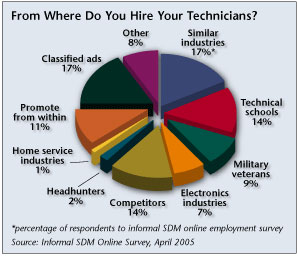
"We have outgrown the available manpower of people who really know what they're doing in this business," Ryan maintains. "More companies have gotten involved, and there [are] not enough people to go around. So what happens is the labor scale has gone way up, and security companies basically just take turns cannibalizing each other's resources."
Recruiting and hiring demands creativity and tenacity. It also helps to learn from others who have a great deal of experience in hiring technical labor. Here's their advice:
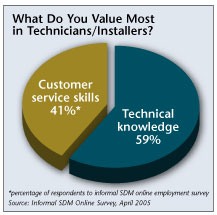
Be Kind to Your Techs
"We pay more, and it's harder to get somebody," Ryan declares. "It's a contest to see who can really build the best working environment. That's the value-add for the employee - to make him happy and to give him great earning ability."Really good salespeople and really good technical people are usually very well cared for by their current employers, so the best of the best are hard to get," Ryan admits. "Our best people we put a moat around, and we protect them as best we can. We don't want them going anywhere."
Keeping employees happy so they recommend the company as a potential employer to their peers is also a strategy used at CPI Security Systems, Charlotte, N.C.
"For the most part, they come to us," asserts Rick Gibbey, CPI's director of operations, about technicians. "We're a very good, solid, well-known company in the Carolinas. Our name is out there. We have resumes coming in all the time from technicians from other organizations that are looking to come aboard.
"I feel like we pay more than anyone else in the marketplace, and we have a lot of benefits for our employees that other companies don't offer, so it really makes it just a dream for me to find good talented technicians when I need them because they come here, they want to work here, and then when they get here, they stay," Gibbey insists. "In our industry, you meet a lot of people out on the job sites, and our technicians pump us up. They say how great we are to work for and they're happy to work here, and that makes it easy to recruit."
Nell Mathews, general manager of Atronic Alarms Inc., Overland Park, Kansas, SDM's 2004 Dealer of the Year, cites word-of-mouth among employees as the best source of new hires.
"I constantly urge the guys to use word-of-mouth for potential new hires," she maintains. "I think it serves us well." She recalls that six years ago, one employee recommended Atronic to a person who was on another job.
"'If you ever want to work for a good company and good people, give this lady a call,'" the employee suggested, giving the person one of Mathews' business cards. That person subsequently was hired by Atronic Alarms, and now is the head of its commercial department.
"We have extreme longevity here," Mathews notes, explaining that plaques commemorating five, 10, 15 and 20 years of service were awarded recently at an employee party. "That's not the norm anymore" in the security industry, she believes.
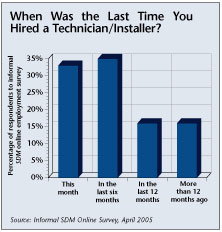
Offer Promotions
Whenever possible, promote current employees to higher positions, such as senior level technicians and even supervisors. Dealers say it encourages others to join an organization that demonstrates there is room for growth."We move all our people up in the organization," CPI's Gibbey notes. "All the managers that work for me except for one all came from within. They all were installers or service technicians. It builds morale. Those are positive things that get our name out there and help us recruit people."
But it's important that owners and managers offer training to those who are promoted and given greater responsibility, because you should want to do everything possible to ensure their success.

Search Other Industries
Some dealers report finding employees in industries that have been hard hit by the economy, such as telecommunications."We're getting a lot of telecommunications folks that come over to our industry," Gibbey reports. "There's just no work out there for those guys. They know how to run wires; they know how to read spec manuals; they know how to do those things, so they've come to fit in our industry very well."
Network
"We use some traditional and some non-traditional ways of acquiring people, and there's really no magic to it - it's just a lot of hard work," ASG's Ryan concedes. For example, ASG managers will inquire about potential hires from other security dealers."We're not encouraging them to tell us where a good tech is, but if they know someone who's mentioned that they're looking to move on, then definitely we'll call in some help to find that person," Ryan notes.
Adds CPI's Gibbey, "I network with the other companies here in the market very closely. They're pretty good about giving me the honest feedback [about employees], as I am. So I have a good networking group of the competition, believe it or not, of our peers.
"If you've got a bad name, you fall to the bottom of the stack in everybody's group, because it is such a small group, tight-knit," he maintains. "We stay in touch even though we're competitors. It's a friendly, competitive thing."

Try Recruiters
"We do use some recruiters when we have to," Ryan admits. "We definitely look at some of the employment boards like Monster.com or Careerbuilder. That's kind of a daily discipline to see who's out there."What does Ryan think of recruiters? "They are costly, and you end up getting the same guy you could have gotten for free with a little more hard work inside your company," he thinks.
Mold Your Own Clay
"We do an apprenticeship up there [in Raleigh] which we don't do in any other office," CPI's Gibbey explains. "We'll take someone straight out of college, or high school in some cases, that has no experience in the industry whatsoever and basically just have them trained for six to eight months and develop them into technicians. That's the only market we really have to do that in. In our other markets, we only hire experienced technicians."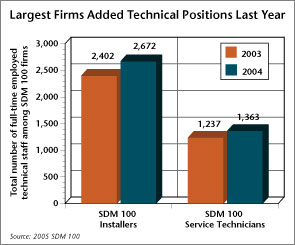
Make Recruiting an Ongoing Practice
The traditional classified advertisement still works well for many firms. It can be through a local newspaper or business magazine, or, if your company has regional or national coverage, the ad may be placed in a trade magazine.In the smaller markets that CPI serves such as Raleigh, N.C., and Winston-Salem, N.C., word-of-mouth is tougher, so Gibbey runs classified ads in local newspapers, but not in Charlotte.
"I always watch my resume pool, and if it dwindles down, I try to run an ad just to get that pushed back up," he explains. "It's always better to have applicants and not need them than to need applicants and not have them."
Other dealers agree.
"We're looking every single day," Ryan declares. "I just dropped about 10 resumes on our operations manager's desk here in our Baltimore/D.C. branch yesterday, and if he could find four good techs in that pile, he'd bring them in today."When someone calls to see if Atronic Alarms is hiring, "my answer to that is 'we are always hiring,'" Mathews says. "It makes it a little hard on me sometimes, but I will always interview or speak personally with anyone that comes through the door that brings something to the table."
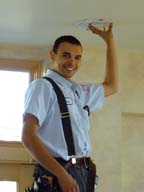
Tap into Contacts
Not all alarm companies go through acquisitions, but those that do should make it a practice to tap into the contacts of the technicians who are part of the acquisition."When you're acquiring [companies], you can acquire those human assets that you need," ASG's Ryan notes. "It's the intrinsic value in a company or an acquisition that a lot of people overlook."
A residential company ASG acquired recently in Texas employed 15 technicians who can install two or three residential systems a day.
"If you had to build a technical force from scratch like that, it would probably take you a couple years," Ryan observes. "We get that automatically. Then those 15 technicians, odds are they came from many different companies, so now you've got another base of networks to go from.
"So the longer people have been around, and the more experienced guys you have, the more you're able to dip into that," he points out. "By region, it can be more difficult for us in one region than another, so our strategies have to be different." He cites Washington, D.C., as a difficult region from which to recruit technicians, but Texas easier.
Dealers also should ask new hires in the sales department about technical people they may know.
"When you recruit and hire a good salesperson, which is easier to find than a technician, usually that salesperson has a favorite installer, someone that took good care of him in his 'old life,'" Ryan points out. "So we try to think outside the box."
He also suggests offering incentives, such as additional training, that can increase an employee's salary. The person who now is head of Atronic's commercial department was attending DeVry Institute when he was hired, and Atronic subsidized his education.

Outline Desired Qualities
Identifying sources of hirable people is one matter; identifying the cream of the crop is another matter. What qualities should you look for?"Dependability, attendance and [being on time] are key," Mathews insists. "I look for a team player with customer service skills. I think technical skills can be taught. However, customer service skills are part of the package - some excel, others don't. With intelligence and a willingness to learn, you can teach the technical side through ongoing training and education."
Gibbey thinks technical and service skills are equally important, but if he had to choose, "I would say probably our customer service skills are more important," he declares. "Because we feel like we can train the technical side a lot easier than we can train the customer service side, because some people just aren't customer service people."
It's the Software Business, Maintains One Recruiter
To recruiter John Rose, owner of National Employment Information Services (formerly Russell, Rose and Associates), Atlanta, finding people qualified to fill technical positions is not hard."The reality is there is almost an overabundance of talent," he insists. "It's getting the security company to understand that they're not really in the hardware business, they're in the software business. It's not about running wires and hooking up cameras and biometrics anymore," he stresses.
"If the Army trusts him to launch missiles… then I think he can probably learn your stuff," Rose declares to security dealers. "So if you find people who are already certified on other pieces of software, it's just a matter of them learning [security], which is pretty quick.
"Yes, they have to pull wires, they have to climb ladders and put a camera up, but that's almost the easy mechanical part of it," Rose believes. "How do you get them to read a manual or get them certified by Lenel or Software House? To get certified on those systems has nothing to do with, `Can you put up a camera upside-down or right-side-up?'"
Rose estimates 90 percent of the people he recruits for the security industry come from outside the industry, such as the military.
"A guy getting out of the military after three or four years, provided he was in electronics and not in artillery, is far more qualified to go into the technical aspect of a business," Rose relates. "The reality is that most of what they do, unless you're firing an M-16, is computer-related. Even if you're on a tank, you have to understand how to program and how to use that particular application. Your 17- to 20-year-olds are far more technical than probably 50 percent of your security technicians, because they've grown up with it."
Service people use laptops rather than screwdrivers nowadays to repair systems, Rose points out.
"I don't think the security industry recognizes the advantage of technical aptitude, and technical aptitude people really do not recognize the security business as that technical," he comments. "The industry is rapidly going to a solutions-driven scenario, and obviously what's pushing it are the vendors. You have to be certified on their product and to get certified, you have to have a certain aptitude, a certain ability. And it really has nothing to do with the alarm business."
Money Talks
Despite the security industry's stated desire for IT professionals, it all comes down to a sobering reality - dollars!"It can be a difficult transition because the IT industry tends to pay 20 to 40 percent more in different areas, but that's leveled off a bit," cautions Robert Biller, general partner/founder, Martin/Alexander Executive Search Inc., Irvine, Calif.
"Obviously during the dotcom 2000 era, it was considerably higher, and we lost a bunch of people, especially in the northern California and Seattle area, to the IT industry when it was going crazy," he remembers. "I mean, they were paying our industry engineers obnoxious salaries, literally doubling them, and there's no way we could get them back.
"Well, it's funny, a lot of them came back to the industry when that bubble popped, but still the salaries are probably 20 percent higher, at least IT-side," Biller estimates.
Some security dealers are paying more for the perfect IT person, he reports, but some aren't. The IT industry is level right now, he forecasts, and it is not typical for IT people to leave their industry.
The company's Web site, wildbullet.com, is used by subscribing security dealers who pay a fee. Resumes can be posted for free.
"Wildbullet is going to be more like carpet bombing," Biller emphasizes. "A lot of times close is good enough for many companies, but some are very specific and they want pinpoint accuracy. That's where a recruitment firm comes in and finds them the right candidate."
Martin/Alexander Executive Search Inc. offers pinpoint accuracy in employee searches for senior-level and mid-level technicians, not entry-level positions, he maintains.
"A good salesperson can probably find their own job," Biller points out. "They're not afraid to knock on doors. Technicians and operations people are a little more timid - they're not built the way salespeople are. So a lot of times they won't go knocking on the door to company X or dropping off a resume because they don't like that confrontation.
"They'll use other resources that are the path of least resistance, which may be recruiting firms, Web sites, and monster.com, and post resumes on those sites along with contacting industry resources such as ours, which will help them in their recruitment efforts," he observes.
"I think the security industry is doing a great job as a career path," Biller maintains. "A lot of companies are really putting requirements on education, on proven sales track records, to come into the industry. In prior years when I was in the industry, you'd see a lot of used-car-salesmen kind of people in the industry, and they just didn't have the technical expertise or professionalism that they do in this day and age for the most part.
"Security is a serious business, and the industry has to have good people for it to remain serious," he emphasizes. "A lot of companies are training their people right and sending them to the manufacturers to get trained."